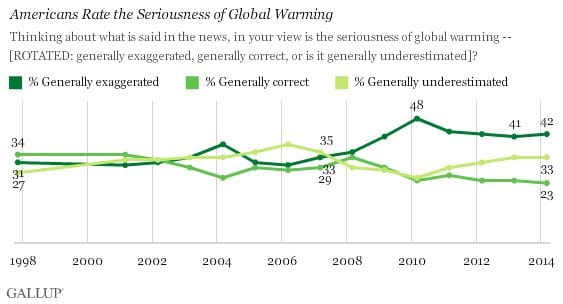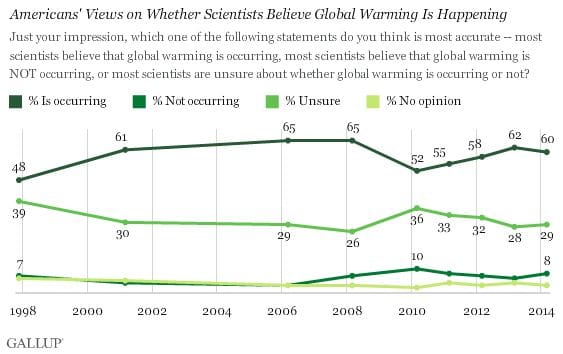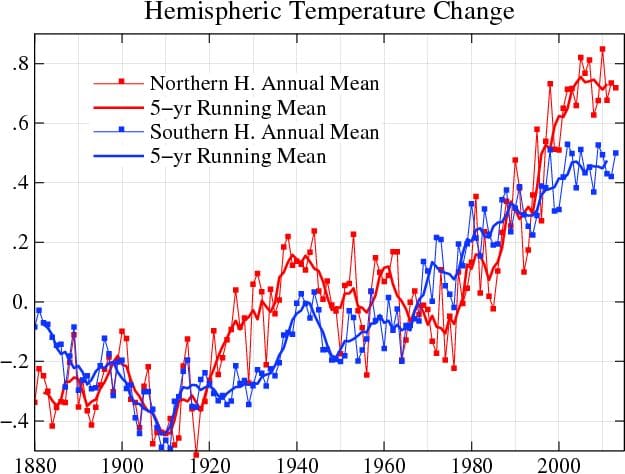42% of Americans Say Global Warming is Exaggerated, Poll Reveals

Gallup’s recent report suggests that the number of Americans perceiving global warming as a serious threat is declining, with almost half of Americans say the concern is exaggerated in both directions of the issue.

Yet, in the same report, in what may be perceived as a contradiction, Gallup shows that a clear majority of Americans say scientists believe that global warming is in fact happening.

And straight from the mouths of scientists?

So where is the disconnect?
To understand the complexity of the issue, we need to understand a bit of the history behind these numbers. Armed with this information, we can see there is far more heating up than the globe.Prior to the 1980s, opinions were fairly consistent across the U.S. that the issue was important. Only after the Reagan Administration did we find ourselves polarized on the issue. Encased in Ronald Reagan’s political ideology, small government was essential for positive economic growth for the nation, and government agencies seen as a burden on the well-being of the nation, including the Environmental Protection Agency, became political targets.
While global warming remained a political debate chiefly among the politicians alone for well over a decade, the public began to mirror partisan lines in the mid to late 1990s. Democrats continued promulgation of impending doom and the GOP remained concerned about the negative financial impact of growing government and expensive “green laws.”
What was once a minor gap in our politics became the Grand Canyon of issues as partisanship capitalized on the schism. The politicians towed partisan lines and in turn exaggerated claims to support that partisanship, influencing our positions. Feeding off one another, the issue snowballed.
Notably missing in the equation? How about pragmatic discussions around scientific data?
One of the most ardent critics of environmental protection laws is Rush Limbaugh. In his disdain for the United Nations, Limbaugh "rushed" to the podium of Reaganomics in vociferous contempt as an international agreement, the Kyoto Protocol, was being considered.
The Kyoto Protocol assigned the financial burden of global environmental issues squarely on the shoulders of developed nations, including the US. However, it was never ratified by the U.S., perhaps rightfully so, as it allowed exemptions for China and India, numbers one and three, respectively, of the most polluting countries on the planet -- the U.S. being number two.Leveling the same complaints, Kyoto has since been rendered impotent by the withdrawals of Russia, Japan, and Canada.
So, how does all this influence the way the U.S. sees global warming?
Juggling careers, families, activities, and life in general, Americans are very busy people. Consequently, the vast majority of Americans form their opinions of the world through their favorite media outlets -- often in short, thirty minute bursts. Frequently, we have neither the ability, nor the time to thoroughly analyze the world around us issue-by-issue, so good or bad, we depend on media to do much of the analytic work for us.
From domestic to global policies, media plays a massive role in America’s culture. And where, but the media, do we hear about global warming?
What was once a trusted, reliable source of raw information with which we could reasonably form an opinion, media has become nothing more than commentary and affirmation, both for those who own and operate those media outlets and for the politicians they support. So it shouldn't be surprising that our politics and media are cohorts in manipulating our perceptions -- exaggerating issues to their benefit.
In a perfect storm of media and politics, the issue of global warming has become extremely polarized. From the end is at hand, to global warming is a worldwide conspiracy (via the United Nations) to displace the U.S. in our economic status, and even playing to the religious, our politicians and media have combined to form the public’s opinion through exaggeration and directional focus.
- Rush Limbaugh
- Mike Sandler, Huffington Post
- Sean Hannity, Fox News
Issues change with the passage of time and many issues routinely take a backseat to the economic temperature of the nation. This does not go unnoticed by those who will manipulate the situation(s) for their benefit, be they media or politicians.
Some issues require a deeper understanding than that which we can get from those who manipulate our perspectives through exaggeration. So, whether you're a dissenter in the global warming issue, or a conformer, it's important to review issues with such serious implications using a large dose of pragmatism to arrive at a non-biased decision.
And, unfortunately, we cannot depend on media or politicians to do so for us. After all, they have a vested interest in directing our attention away from the table with the shells on it.
Photo retrieved from WND.com.




